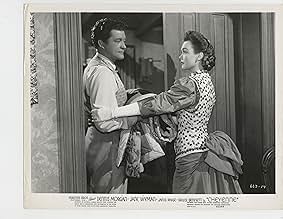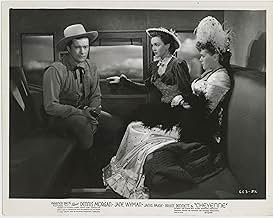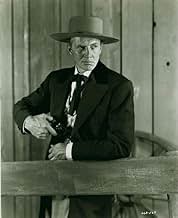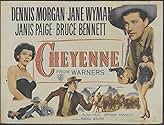Cheyenne
- 1947
- Tous publics
- 1h 39m
IMDb RATING
6.5/10
705
YOUR RATING
To avoid going to trial, a gambler becomes a detective for an insurance company to find out who is robbing the stages.To avoid going to trial, a gambler becomes a detective for an insurance company to find out who is robbing the stages.To avoid going to trial, a gambler becomes a detective for an insurance company to find out who is robbing the stages.
- Director
- Writers
- Stars
- Awards
- 1 win total
Anne O'Neal
- Miss Kittredge
- (as Ann O'Neal)
Robert Alderette
- Shotgun Rider
- (uncredited)
Hubert Brill
- Card Expert
- (uncredited)
- Director
- Writers
- All cast & crew
- Production, box office & more at IMDbPro
Featured reviews
It's the Wyoming Territory 1867. Lone bandit 'The Poet' is hounding Wells Fargo stagecoaches. The law catches up to gambler James Wylie (Dennis Morgan). He's given one choice. He has to catch The Poet. He and Ann Kincaid (Jane Wyman) have a meet-cute over a bath. They and Emily Carson (Janis Paige) board the stagecoach.
The meet-cute is fun. The misunderstanding afterwards is even better. It's a pretty threesome and pretty fun. It's too bad that the potential love triangle gets sidelined. The story could play with that a bit more. There are probably way too many bandits. The only bandit that matters is The Poet. It's interesting to have The Sundance Kid watching this from the future. This is a fun western.
The meet-cute is fun. The misunderstanding afterwards is even better. It's a pretty threesome and pretty fun. It's too bad that the potential love triangle gets sidelined. The story could play with that a bit more. There are probably way too many bandits. The only bandit that matters is The Poet. It's interesting to have The Sundance Kid watching this from the future. This is a fun western.
There are just enough new era elements in CHEYENNE to keep us interested and titillated, for a "typical" western directed by Raoul Walsh, who had directed his share of them. Well-dressed gentleman Wylie (Dennis Morgan) takes the stage to Cheyenne with Ann Kincaid (Jane Wyman) and Emily Carson (Janis Paige). Wylie's job is to bring in the "poet" robber, who is holding up all the stage coaches even before the regular robbers can get to them. It probably would have been too naughty to show one of the women in the bath, so we see Morgan take a bath in the hot water brought up for Ann. Throughout the film, Wylie and Ann toy with the fact that they may be married (for the inn-keeper's sake)... Also some pretty risqué chit-chat between Kincaid and Wylie. Pretty rough for a movie industry that had been under restrictions for ten years. Beautiful outdoor scenery of Sedona, although it looks like some backdrops were used during filming the chase scenes. There are some good surprises in here to keep things lively. Keep an eye out for Alan Hale senior, who was great in any type of film. He doesn't have a big part, unfortunately, which left him time to make five films in 1947. He made 235 films in less than 40 years... more than 6 films a year. Busy guy. Cheyenne didn't win any Oscars, but Jane Wyman will go on to win one in 1949 for Johhny Belinda.
There is nothing particularly wrong or bad about "Cheyenne". But, for that matter, there's not all that right or good about it either. It seems just okay in most every way....and I think part of it is because both Dennis Morgan and Jane Wyman seemed a bit out of place in the leads.
When the story begins, professional gambler James Wylie (Morgan) is approached with a proposition....to find 'The Poet' or else! Well, he didn't like the 'or else' so he travels to the next town to look for the identiy of this bandit who has robbed many stage coaches. Along the way, he hooks up with a lady who doesn't particularly like him (Wyman) and eventually he sorts it all out and there is, of course, a happy ending.
Despite being directed by Raoul Walsh, the film seemed a bit long and dull to me. I have a hard time putting my finger on exactly what left me rather cold about this one...but it rarely seemed interesting and long before it was finished I found myself getting bored despite it being a polished Warner Brothers production.
By the way, if you do watch it, at about 89 minutes into the film, a gang jumps on their horses and gives chase. One of the folks giving chase has his hat fly off...but when they catch up to the guy, they all are wearing hats!
When the story begins, professional gambler James Wylie (Morgan) is approached with a proposition....to find 'The Poet' or else! Well, he didn't like the 'or else' so he travels to the next town to look for the identiy of this bandit who has robbed many stage coaches. Along the way, he hooks up with a lady who doesn't particularly like him (Wyman) and eventually he sorts it all out and there is, of course, a happy ending.
Despite being directed by Raoul Walsh, the film seemed a bit long and dull to me. I have a hard time putting my finger on exactly what left me rather cold about this one...but it rarely seemed interesting and long before it was finished I found myself getting bored despite it being a polished Warner Brothers production.
By the way, if you do watch it, at about 89 minutes into the film, a gang jumps on their horses and gives chase. One of the folks giving chase has his hat fly off...but when they catch up to the guy, they all are wearing hats!
Critics like Phil Hardy have tended to dismiss Cheyenne as the least of Walsh's Westerns. My own viewing suggests a reassessment is in order. I saw this movie with another Walsh title, the more highly esteemed Along The Great Divide, just afterwards and was struck by how much more interesting, playful and modern the former appeared. By contrast Divide seemed predictable and more schematic.
The barely concealed sexual nature of much of the banter between hero Dennis Morgan (Wylie) and the two women he encounters - particularly Jane Wyman (Ann) who, for a period, poses as his wife - as well as the episodic nature of the plot is what gives the film its particular flavour today.
Another attraction is that like other Walsh Westerns (Pursued, Colorado Territory etc) noir elements are also prominent in Cheyenne. The overriding tone is cynical and Morgan's own predicament, as a man who has to solve a crime to clear himself of his own past, brings with it a background air of persecution closely related to that other, typically urban, genre. Ann has the air of a femme fatale, while the Sundance Kid (another marvellously laid back performance by Arthur Kennedy) insinuates suitable menace. In fact, I found his demise somewhat surprising as I would normally expect such a strong character to last to the showdown at the end of the film.
One of the most impressive scenes in the film is when Wylie and Ann face the returning robbers in the ramshackle hut they have shared with them the night before. The gunfight that follows is done imaginatively, while Walsh's talent as director are fully on display as he creates suspense through cutting and framing. At this time Wylie and Ann are still carrying on the husband and wife pretence which adds a further level of tension to the proceedings.
If there is a problem with the film it is in the occasional jarring nature of tone. Scenes follow each other that are menacing, flirtatious and comic. This creates a feeling of unease for the viewer that was perhaps deliberate, but the sudden gear change can also just be disconcerting. The musical score is outstanding as is the cinematography and both add immeasurably to the quality of the production.
Dennis Morgan made more impact on me in this film than he ever has before - perhaps because I have never looked out for him in particular. Here he is surprisingly muscular, a worthy foil for the machinations of the chief villain The Poet. The Poet's precise relationship to his wife is one of the most intriguing aspects of the early part of the film. Morgan's own teasing relationship with the two women he meets on the stage (both at the start and again at the conclusion of the film - a nice circular touch) is also interesting and provoking. Far more than the stereotypical Good girl/Bad Girl duality that appears in B-Western plots, the two women represent something more sophisticated and interesting, something that keeps the viewer interested.
This may be a forgotten film today, but if you like Westerns it is one definitely worth making an effort to see. It is not on the level of Walsh's very finest work but is still a good film, one in which the varied plot line and adult 'knowingness'of the leads give great enjoyment.
The barely concealed sexual nature of much of the banter between hero Dennis Morgan (Wylie) and the two women he encounters - particularly Jane Wyman (Ann) who, for a period, poses as his wife - as well as the episodic nature of the plot is what gives the film its particular flavour today.
Another attraction is that like other Walsh Westerns (Pursued, Colorado Territory etc) noir elements are also prominent in Cheyenne. The overriding tone is cynical and Morgan's own predicament, as a man who has to solve a crime to clear himself of his own past, brings with it a background air of persecution closely related to that other, typically urban, genre. Ann has the air of a femme fatale, while the Sundance Kid (another marvellously laid back performance by Arthur Kennedy) insinuates suitable menace. In fact, I found his demise somewhat surprising as I would normally expect such a strong character to last to the showdown at the end of the film.
One of the most impressive scenes in the film is when Wylie and Ann face the returning robbers in the ramshackle hut they have shared with them the night before. The gunfight that follows is done imaginatively, while Walsh's talent as director are fully on display as he creates suspense through cutting and framing. At this time Wylie and Ann are still carrying on the husband and wife pretence which adds a further level of tension to the proceedings.
If there is a problem with the film it is in the occasional jarring nature of tone. Scenes follow each other that are menacing, flirtatious and comic. This creates a feeling of unease for the viewer that was perhaps deliberate, but the sudden gear change can also just be disconcerting. The musical score is outstanding as is the cinematography and both add immeasurably to the quality of the production.
Dennis Morgan made more impact on me in this film than he ever has before - perhaps because I have never looked out for him in particular. Here he is surprisingly muscular, a worthy foil for the machinations of the chief villain The Poet. The Poet's precise relationship to his wife is one of the most intriguing aspects of the early part of the film. Morgan's own teasing relationship with the two women he meets on the stage (both at the start and again at the conclusion of the film - a nice circular touch) is also interesting and provoking. Far more than the stereotypical Good girl/Bad Girl duality that appears in B-Western plots, the two women represent something more sophisticated and interesting, something that keeps the viewer interested.
This may be a forgotten film today, but if you like Westerns it is one definitely worth making an effort to see. It is not on the level of Walsh's very finest work but is still a good film, one in which the varied plot line and adult 'knowingness'of the leads give great enjoyment.
It was all said above. This is a rewarding movie to watch with good depth. I'd just like to add that the removal of Arthur Kennedy half way through the film, just as Alan Hale finally makes an entrance, is interesting. It's almost as though Raoul was having a hard time with Mr. Kennedy and had a part written to replace him with the `Skipper's' dad.
The ending is a wee bit of a surprise only because just as it looks like thing may not turn out the way we expect them too, they do. Yes Mr. Walsh did make many memorable westerns (I've seen the majority of them) but it's almost as though he was trying to move into another direction with this picture. Weather audiences appreciated it or not are still to be seen.
Scotty Jensen Racine, WI. USA
The ending is a wee bit of a surprise only because just as it looks like thing may not turn out the way we expect them too, they do. Yes Mr. Walsh did make many memorable westerns (I've seen the majority of them) but it's almost as though he was trying to move into another direction with this picture. Weather audiences appreciated it or not are still to be seen.
Scotty Jensen Racine, WI. USA
Did you know
- TriviaThe TV series Cheyenne (1955) starring Clint Walker was supposedly based on this film, although there is no actual connection beyond Warner Brothers' owning the title.
- GoofsWhen Ed Landers turned around to shoot uphill at James Wylie who was coming in behind him, his gun went off before he was turned halfway around, when it was still pointed at the ground.
- Quotes
The Sundance Kid: When are we gonna start workin' together?
James Wylie: I'll tell you when just as soon as I finish my honeymoon.
The Sundance Kid: You already had one.
James Wylie: We want another one. You know how women are - like bears, they never get enough honey.
- ConnectionsFeatured in Frances Farmer Presents: Wyoming Kid (1958)
- How long is Cheyenne?Powered by Alexa
Details
- Release date
- Country of origin
- Language
- Also known as
- La nuit du bivouac
- Filming locations
- Sedona, Arizona, USA(environs used for Wyoming locations)
- Production company
- See more company credits at IMDbPro
Box office
- Budget
- $1,929,000 (estimated)
- Runtime
- 1h 39m(99 min)
- Color
- Aspect ratio
- 1.37 : 1
Contribute to this page
Suggest an edit or add missing content


























